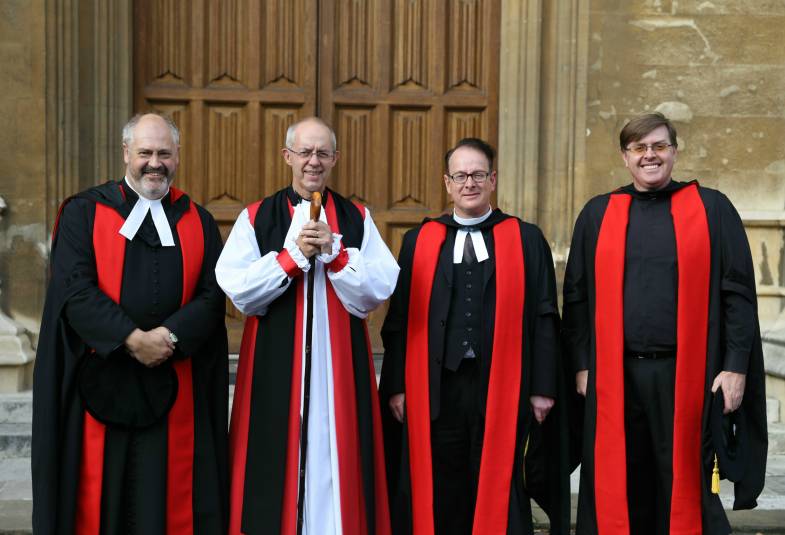The Archbishop makes specific awards each year in the form of the Lambeth Degrees and a suite of non-academic awards.
Lambeth Degrees
The Peter's Pence Act of 1533 gave the Archbishop of Canterbury the power to grant academic degrees (previously bestowed by the Pope). It allowed the Archbishop to override the requirements of the only two universities at the time, Oxford and Cambridge, and to grant degrees by dispensation from the usual requirements for residence and, in some cases, examination, at a time when it was difficult to travel to the universities, often because of outbreaks of the plague. This power to grant degrees did, and still does, require confirmation by the Crown and so the degrees are known as 'degrees of the realm'. All recipients have to be able to swear an oath to the monarch since the act of 1533 speaks of the monarch conferring degrees on his subjects. The Archbishop's power to continue to grant these degrees is expressly set out in the Education Reform Act 1988.
By tradition, the academic robes used are those of the university attended by the incumbent archbishop. In the case of Archbishop Justin Welby, this is the University of Cambridge.
The Archbishop's Examination in Theology

Since 2007, the Archbishop of Canterbury has awarded postgraduate degrees by research (MPhil and PhD) under the scheme known as the Archbishop’s Examination in Theology (AET).
Until 2007 the AET comprised the Diploma of Student in Theology (the Lambeth Diploma) and the Degree of Master of Arts by Thesis (the Lambeth MA).
The Lambeth Diploma was instituted in 1905 by Archbishop Randall Davidson. It provided an opportunity for women to study theology, principally so that they could teach religious education in schools and churches. In later decades it was open to both men and women and the means of study was either by examination or thesis. The Lambeth MA was inaugurated by Dr Runcie in 1990 in order to provide an opportunity for theological study at a more advanced level. The Department for Education and Skills viewed the Lambeth MA in the same light as a Lambeth Degrees MA, in that it was examined to the level of an Oxbridge Masters degree and the Archbishop the dispensation from residence applied.
In 2007 the AET moved in a new direction. The AET Council introduced an MPhil research degree, with the opportunity to extend to a PhD. The Lambeth MA was phased out as students completed the course. After further evaluation in 2009, the Council also decided to phase out the Lambeth Diploma in order to focus its resources on the research degree programme.
The reasoning behind the introduction of the MPhil/PhD courses was to meet the unparalleled challenges and opportunities facing the Church through by offering opportunities for thorough, critical and detailed research, and analysis and interpretation. These research courses are offered at a level that meets QAA requirements but at a reasonable cost and with 'user-friendly' access. Although allocated research supervisors will be fully qualified to offer guidance and criticism, the emphasis is on individual research, requiring a high level of self-motivation and commitment to study.
For further information about the MPhil/PhD research degrees please visit the AET website.
Non-AET Lambeth Degrees
The Archbishop retains the authority to grant degrees by dispensation from residence, directed research or examination. Such degrees remain full and 'real' degrees under the terms of the original 1533 legislation, in that the recipient’s work must be considered worthy of the degree. Yet these degrees are also given as a thanksgiving from the Church for distinguished service – thus they have an honorary character also. They can be awarded in Divinity, Law, Arts, Medicine or Music.
Such degrees are awarded entirely at the discretion of the Archbishop. Possible recipients may not apply for a degree themselves but must be nominated by someone who knows their work very well, is qualified to judge its merit and is supported by other suitably qualified co-nominators. Not least given that the new suite of awards include one for education and scholarship (see below), Archbishop Justin Welby does not plan to award any such degrees in the short term, so such nominations are not currently invited.
Non-academic Awards
In March 2016 the Archbishop of Canterbury announced a new set of non-academic awards to recognise outstanding achievement in various fields. The new suite of awards consist of three existing awards – the Lambeth Cross, the Canterbury Cross and the Cross of St Augustine – and six new awards named after previous holders of the office of Archbishop of Canterbury. The awards were designed by Annabel Panes, then Head Designer at Cred Jewellery, a Fairtrade jeweller.
2025 Award Nominations
The nine non-academic awards listed above will next be awarded in mid-2024. Nominations for these closed on 30 September 2023.
Nominations for the above awards to be presented in 2025 may now be made.
Please complete the online form below OR download the WORD document here and complete it electronically or in hard copy.
Please note:
Self-nominations are not accepted.
Nominees should not be made aware of their nomination.
Forms providing insufficient information may not be considered.
If nominations are successful, the nominee only will be informed by Lambeth Palace. The names of those receiving awards will be publicised on the Archbishop’s website after the presentations are made in the spring of 2024.
If nominations are unsuccessful, neither the nominee nor the nominator will be informed and it is unfortunately not possible to enter into correspondence on the outcome.
All completed nomination forms for 2025 should be submitted by 30 September 2024, preferably via the online form or by email or, if necessary, in hard copy to:
Lambeth Awards
Chaplaincy
Lambeth Palace
London SE1 7JU
CONFIDENTIAL when completed.
Online Nomination Form for 2025 Lambeth Awards